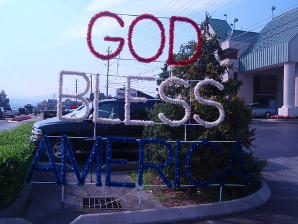It is ironic that, as the world’s first secular democracy having scorned all state religion, we soon became and have remained, socially and politically, preoccupied with god. Campaign speeches end with “God bless you.” The song, “God Bless America,” which Irving Berlin wrote as a parody sung by a comically chauvinistic character, is now performed as a patriotic hymn.

We brought our first religious schism directly from Europe, and it stayed prominent in our political agenda for 200 years. There were only two significant religious groups in early America – Catholic and Protestant – for the first hundred years, and their fight was not simply a political debate. It was filled with deep personal hatred and fear, exclusion of Catholics from public events, resentment of Protestants and their position of privilege. The fight had been violent in England, and it was barely less so in America. The teaching of Protestantism in public schools motivated the Catholics to build their own school system. This, in turn, created a boost to the anti-Catholic, anti-Jewish, anti-black Ku Klux Klan. Throughout the century, the Catholic-Protestant rift was also an immigrant-nativist fight leading back to the time when we were still British colonies.
Not until 1928 did a major party nominate a Catholic for president. Al Smith was a popular four-time governor of New York. Although he was of mixed European ancestry, he identified as an Irish Catholic, which was enough to ensure his defeat. Religion was a big part of his loss as he was victim to the legends of Catholics’ absolute loyalty to the Pope and the stereotype of the Irish as street fighters. Neither was credible, but they were believed by enough people to give them an excuse to send Smith to a resounding defeat.
The same issues were argued 30 years later when young, charismatic John F. Kennedy was on the Democratic ticket, and, as before, the arguments were too often spiteful. Kennedy won in a close election, and his popularity ended the argument permanently. The current Democratic nominee is Joe Biden. He is Catholic, and the only person who mentions that is Joe Biden.
There were also some Jews in the legislature, a few in the 19th century but growing in number in the 20th as the children of immigrant groups matured. Jews were ill-treated in society, though over time they carved a small and growing political niche. Jews have not fared as well in the executive races, but it is likely only a matter of time until they do. The only Jew nominated by a major party for executive office was in 2000, when Al Gore chose Joe Lieberman to be his running mate. This was widely seen less as risky than as opportunistic, an attempt to bring back the Jewish vote, which had been drifting away from the Democratic party. The race was essentially a tie, marred by poorly designed ballots in Florida and controversy in several states. The Supreme Court halted vote counting, which gave the Presidency to George W. Bush. Today, both Catholics and Jews are overrepresented in Congress with almost no religious controversy.
In recent years, Americans have become less tolerant of religions’ involvement in politics. In the first decade of this millennium, for the first time since modern polling, most Americans would be willing to vote for a qualified candidate who is Muslim or atheist. A majority also responds that a candidate’s human values are more important than their shared religion. However, most Americans see religion as a positive influence in society.
Buddhists, Muslims, and Hindus are underrepresented – as are nonbelievers. It is likely that the 16 representatives who refused to state their religious affiliation include some nonbelievers. Politics exists because people disagree, a view that has not disappeared and will not soon. American Muslims suffer from this fact more than others do, with serious threats haunting them. However, the vicious rancor that haunts the Muslims in Congress, raising to the level of death threats, has no place in the modern world, and today almost all Americans agree.
Recent surveys show that most Americans are more likely to vote for a candidate who has the same values rather than the one who has the same religion. It seems that we are reaching back to Europe, which first taught us religious bigotry. Eventually we learned, however slowly, modern Europe’s philosophy that religion is personal, while humanity is shared among all of us. There is still much religious bigotry in the United States, but recent polls show that it affects our politics less as time goes on.
21,494 Total Views, 6 Views Today






